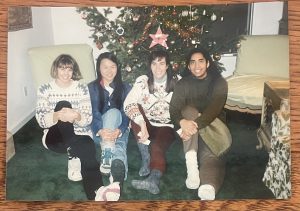I recently came across some interesting research on how to maintain friendships, and why we often don’t. You know how someone pops up in your mind, and you wonder how they’re doing, and you think you should reach out? And then you don’t?
Besides just the fact that we’re all too busy, we often don’t reach out because we’re afraid it’s been too long, and it will be awkward for us to show up in their inbox or on their phone out of the blue. And we figure they don’t care, anyway, so why make the effort.
But the research (I was turned onto it by the author Daniel Pink, and you can watch the video he made about it and link to the research articles by clicking here) shows precisely the opposite. It’s not awkward, and most of the time, people do care. They’re happy that you reached out!
Just the other day a high school friend of mine texted, asking if I had time to chat. We hadn’t connected in at least a year or more, and we had a lovely conversation about everything going on in our lives and with our families. I was delighted that she reached out.
I had thought about reaching out to all of you the other day because I read a passage from the Daily Stoic that spoke to me. I wanted to share it, but I didn’t, because I was busy, and besides, would you care? And then I came across Daniel Pink’s video and thought, well, odds are you would care and maybe even be happy to hear from me. So here I am, and here’s the piece I wanted to share with you. It’s called, “Make It Better,” by Ryan Holiday:
Why are we here?
It’s not an easy question to answer. One could say that on a fundamental evolutionary level, we’re here to pass along our genes. This is why we strive for success. This is why we lust for sex. This is what keeps the species going.
But equally encoded in that evolutionary software and in our culture is another purpose, another less selfish drive: the drive for meaning. Which actually leads to a pretty simple answer to the question of why we’re here. As Temple Grandin, an autistic woman who is one of today’s leading scientists and animal behaviorists, said in an interview with The New York Times:
“The meaning of life is if something that you did made something better. Like, I get an email from a parent: Thank you so much. My kid is employed now because I read one of your books. That is a little piece of the meaning of life right there.”
“The fruit of this life,” Marcus Aurelius wrote, “is good character and acts for the common good.” Indeed, the greatest achievements in human history are unselfish ones. It’s art that gives people hope or insight. It’s a scientific breakthrough that makes things better for everyone. It’s the collective sacrifices. It’s the tackling of hard problems together.
It’s that Stoic idea that we are here for each other, that we are bees of the same hive, that we are here to make things better for others, for the next generation, that makes life meaningful and worth living. Because in doing so, we find happiness and respect for ourselves.
So to tie it all together, reaching out to an old friend is a great way to make it better. Not only do we make things better for that person, but also for ourselves in the process. (Thanks, Subha! You made my day!)
P.S. – One more thing I heard about from Daniel Pink that’s worth sharing. It’s a site called www.Neal.fun, and it has a variety of interactive games and activities. I found the Rocks meditative – and challenging – and who knew the Deep Sea was so…DEEP?!? The Absurd Trolley Problems are also quite thought-provoking. I hope you enjoy!


